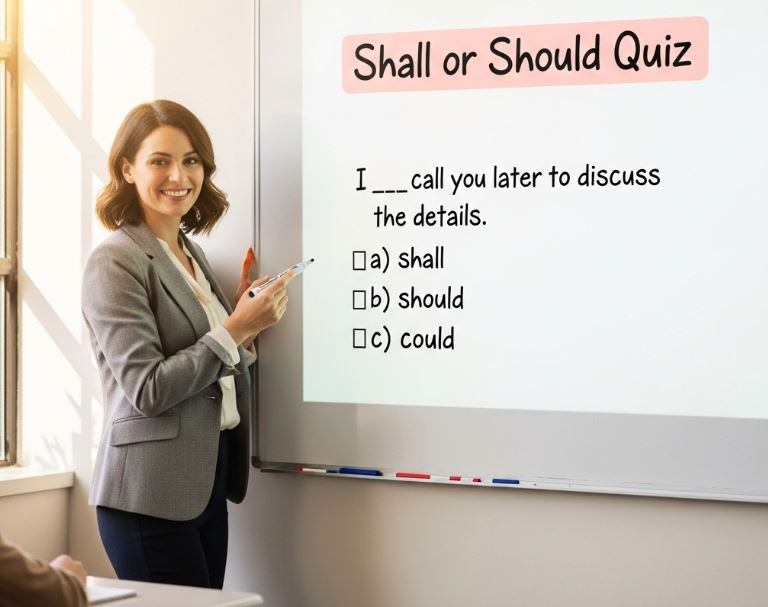In English grammar, “shall” and “should” are modal verbs that can confuse learners because they often appear in similar contexts but have different uses. Try to give the shall or should quiz test and improve your English grammar skills.
- Shall is more formal and is often used in offers, suggestions, and to express determination. It is also used in legal or official language to indicate obligations.
- Should is used to give advice, express expectations, show probability, or indicate a moral obligation.
Mastering the difference between these two will improve your writing, speaking, and understanding of English. This Shall and Should Quiz will help you practice their correct usage in real-life situations.
Shall or Should Quiz
Give another more related quiz test here: would Quiz
Examples and Exercise of the Shall and Should Quiz
1. I ___ call you later to discuss the details.
a) shall
b) should
c) could
2. You ___ wear a helmet when riding a bike for safety.
a) shall
b) should
c) may
3. We ___ meet at 7 PM if that’s convenient for you.
a) shall
b) should
c) can
4. According to the rules, no one ___ enter without a pass.
a) would
b) should
c) shall
5. It’s getting late; you ___ start your homework now.
a) shall
b) should
c) could
6. I ___ be happy to assist you with your application.
a) shall
b) should
c) will
7. Every member ___ sign the attendance sheet before leaving.
a) can
b) should
c) shall
8. You look tired; you ___ take some rest.
a) shall
b) should
c) may
9. The winner’s name ___ be announced at the end of the event.
a) shall
b) should
c) might
10. We ___ follow the safety guidelines at all times.
a) shall
b) should
c) must
Answers
- a) shall
- b) should
- a) shall
- c) shall
- b) should
- a) shall
- c) shall
- b) should
- a) shall
- b) should
FAQs about Shall and Should
What’s the main difference between “shall” and “should”?
“Shall” is often used for formal offers, promises, or official obligations, while “should” is used for advice, recommendations, and expectations.
Is “shall” still used in modern English?
Yes, but it’s less common in casual speech and more common in formal writing, legal documents, and British English.
Can “should” replace “shall” in all sentences?
No. While in some contexts they may overlap, “shall” expresses determination or obligation, while “should” expresses advice or moral duty.
Last Word
Understanding shall vs. should is key to improving your grammar skills. While both are modal verbs, they have distinct roles in expressing obligation, advice, and intention.
By practicing with quizzes like this one, you’ll be able to confidently choose the right word in any situation. Keep practicing, and soon “shall” and “should” will feel natural in your speech and writing.

